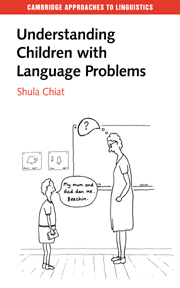Book contents
Introduction
Published online by Cambridge University Press: 05 September 2012
Summary
Some children can't um - can't even um - they can't even talk or anything like that and they can't talk properly. And they get trouble by talking and um - things like that.
Ian, aged 9Ruth: My mum and dad - dan me. And my brothers.
Adult: Your mum and dad -?
Ruth: My daddy and mum - h - they sidan me.
Adult: They send you?
Ruth: No dand me. Beechin.
Adult: What do they do?
Ruth: Nothing!!
This exchange took place between 10-year-old Ruth and myself. After a precarious start, it appears to have come to a dead-end. But with a bit of encouragement, Ruth starts again, slowly, weighing her words:
Ruth: My mum and daddy, those two - those stand me.
Adult: Understand?
Ruth: Yes!!
Adult: They understand you?
Ruth: Yeah.
We've arrived.
Our struggle over words speaks volumes. Ruth has initiated the conversation. She is quite definite about what she wants to communicate. Behind her eventually clear assertion that her family understand her lies her implicit recognition that other people don't. I prove her point with my persistent failure to understand that key word ‘understand’. Ruth is ready to give up. It is just too hard to get her understanding understood.
Damian is 21, and describes himself as ‘dysphasic’. He, too, can have difficulty getting his message across. He explains how he deals with this situation:
Keep going. If it doesn't work, give up. Go on something else. If someone, like if someone talks to me, and I talk back to them but not in a nasty sen just ans - answer their question and they walk off, I just look at them and, ah, hell with you, and walk off.
- Type
- Chapter
- Information
- Understanding Children with Language Problems , pp. 1 - 10Publisher: Cambridge University PressPrint publication year: 2000

